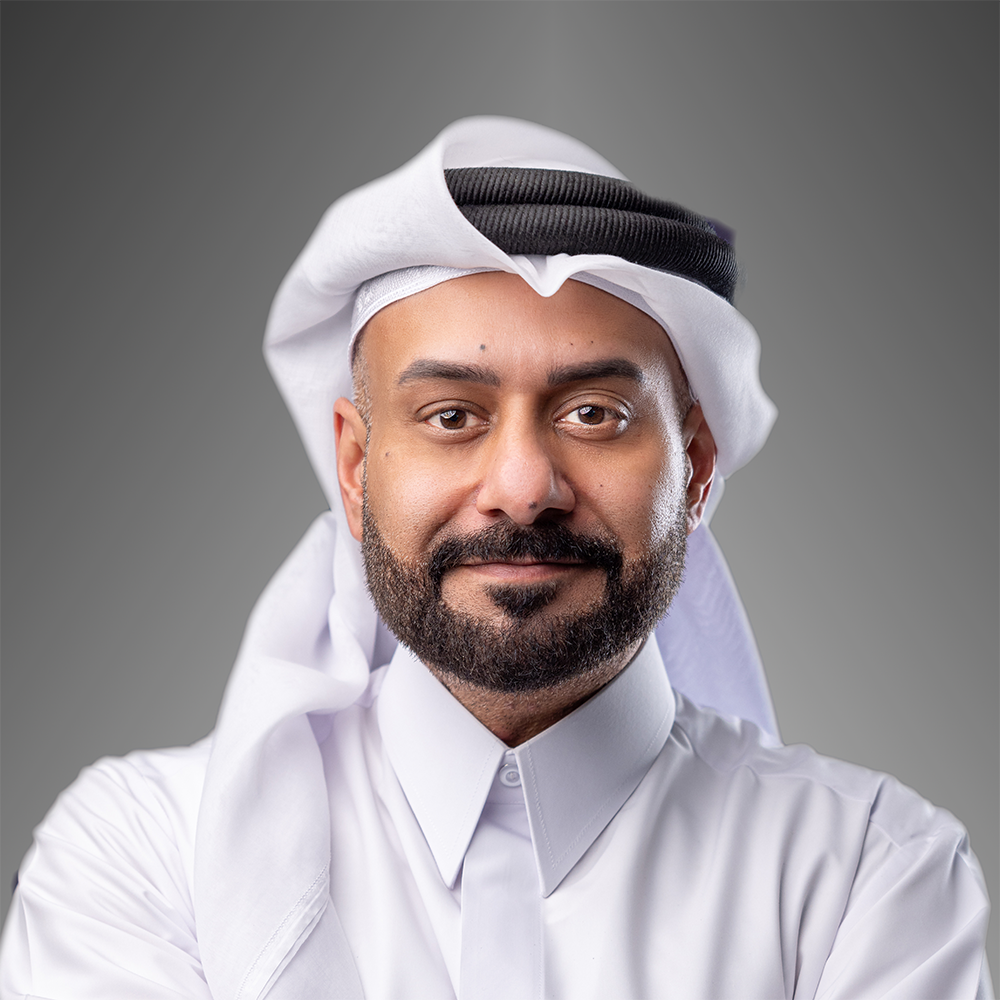CEO Foreword
Welcome to the July–August edition of the QFC newsletter.
I am pleased to highlight that the QFC has witnessed a 64 per cent year-on-year growth in the first half of the year, reflecting the impact of our strategic reforms to facilitate market entry, targeted business development, and proactive stakeholder engagement. Beyond this notable performance, this growth underscores investor confidence in the Qatari market and in the QFC as a preferred business hub in the region.
Over the past two months, we welcomed 129 new firms, increasing the total number of companies on our platform to over 3,300.
In this issue, we highlight our recent efforts to attract business to the country, as well as our strategies for creating quality work environments and strengthening trust and resilience across the financial ecosystem.
I invite you to explore this newsletter for insights into our work and the local and international economic trends.
Thank you for your continued interest and support.

Yousuf Mohamed Al-Jaida
Chief Executive Officer, Qatar Financial Centre
Firms Registered with QFC in July and August
Total Number of Firms
Events hosted, engaging over 100 business leaders and industry professionals
Growing Economy and Investor Confidence
Qatar economy has achieved 3.7 per cent real growth in the first quarter of 2025, powered by the non-hydrocarbon sector, which contributed nearly two-thirds to the GDP. Along the same lines, the real estate market just had its best quarter since 2020 with QAR 8.9 billion total transactions—a 29.8 per cent uptick from the same period in 2024—pointing to renewed market confidence among residents and investors alike.
That same confidence is reflected in the country’s global standing. Qatar has advanced 21 places to the 12th position on the global FDI Performance Index 2025, attracting almost twice as many foreign investment projects in 2024 compared to the year before and creating thousands of jobs. With major industrial projects underway, Qatar offers opportunities beyond its traditional energy base.
Global Positioning and Peaceful Stability
Qatar has once again been recognised as the most peaceful country in the MENA region according to the Global Peace Index, holding the spot for the 17th consecutive time. It also remains the only country in the region to place among the world’s top 30, a reflection of the country’s strong institutions, public safety, and steady governance. This stability has supported a thriving tourism sector, which welcomed over 2.6 million visitors in the first half of 2025.
Financial Innovation and AI Acceleration
Artificial intelligence is moving quickly into Qatar’s business landscape. A Qatar Development Bank report highlights its strong potential in healthcare and finance, and promising prospects in manufacturing, e-commerce, and media. It also highlights key strategies to effectively adopt AI across these sectors. The Ministry of Communications and Information Technology is backing this technological shift, supporting SMEs to adopt AI and build new capabilities. CEOs are also leading the charge: almost 90 per cent have already adopted generative AI, a figure that outpaces the global average. With national investment in digital infrastructure set to rise sharply by 2026, Qatar is laying the groundwork for a technology-driven economy.
Finance is moving in step with this transformation. Drawing from discussions at the inaugural Digital Assets Policy Roundtable, the Qatar Financial Centre (QFC) recently released a report on unlocking the full potential of real-world asset tokenisation, identifying it as a key to broader market access and financial inclusion.
Sustainability and Energy Transition
Qatar’s first sovereign green bond worth $2.5 billion, drew overwhelming global demand, setting a benchmark for the region and positioning Qatar as a leader in sustainable finance. Proceeds from the bond will fund renewable energy, water and green building projects that align with Qatar’s long-term climate goals.
On the ground, solar power is reshaping the energy mix. The Al Kharsaah plant now supplies tens of thousands of homes, while new sites in Ras Laffan and Mesaieed have lifted total capacity to nearly 15 per cent of peak demand. Together, these projects cut millions of tonnes of emissions and move Qatar closer to its 2030 target of more than 4,000 megawatts of renewable energy.
Fairness in the Workplace: QFC’s Approach to Employment Standards
As the global business landscape and multigenerational workplaces evolve, expectations around workplace culture, rights, and responsibilities are also changing. Financial stability and job security are no longer the primary priorities, especially for millennials and Gen Z. The younger generation seeks purpose-driven work, empathetic managers, and employment practices that reflect modern standards of fairness and equity.
Amid the global war for talent, forward-thinking organisations must provide more than competitive benefits. They must offer work environments that promote fairness, respect, mental wellbeing, inclusion, and work-life balance to attract, retain, and engage talent. People are the most important asset of an organisation, and workplaces built on fairness, trust, and transparency have been shown to drive employee engagement, unlock innovation, and enhance business performance.
Focusing on people and workplace quality extends beyond organisational outcomes. Decent work—that is, work that is productive and delivers a fair income, workplace security, and opportunities for personal development—is a cornerstone of sustainable progress because the quality of work people perform cannot be separated from economic growth.
Fairness in the workplace and dignified work, therefore, should be considered business imperatives.
In September 2015, the Qatar Financial Centre (QFC) established the Employment Standards Office to foster transparent and fair work environments. Since then, the Employment Standards Office has advanced decent, dignified, and equitable working conditions for all. QFC’s approach is anchored in our core values and aligned with international best practices, including the UN Sustainable Development Goals and the Social pillar of Environmental, Social and Governance standards.
The Employment Standards Office sets clear, fair employment practices, including non-discrimination, zero tolerance for bullying and harassment, and amicable conflict resolution through conciliation and mediation.
Ten years down the line, this commitment has grown stronger and has played a critical role in the company’s growth trajectory. We have seen firsthand that raising employment standards is not just about compliance; it is a strategic means of unlocking the full economic potential of our business ecosystem. To sustain this, it is important to recognise that fair labour practices are not static. Organisations must therefore engage regularly with employees through social dialogue, capturing their voices and feedback to ensure that regulatory frameworks and workplace culture align with current labour market needs and remain fit for purpose.
Fostering fairness in the workplace and dignified work are more than ticking regulatory boxes—it’s about creating an environment where people thrive. It is a shared responsibility, and one that pays dividends: businesses flourish when employees are treated with dignity and respect.
Luigia Ingianni
Commissioner, Employment Standards Office – QFC
The QFC’s Data Protection Rules: Setting the Standard in the Region
The Qatar Financial Centre (QFC) Data Protection Regulations and Rules 2021 have rapidly emerged as a gold standard for data privacy and security in the region. Drawing inspiration from the Qatar State Legislation Law 2016, the Regulations were meticulously crafted with Qatar’s unique legal, cultural, and economic context in mind. This blend of global best practice and local relevance ensures that QFC-licensed firms operate within a robust, future-ready data protection environment.
A Regional Leader with Global Roots
While the QFC Data Protection Regulations echoes global data protection principles such as lawfulness, fairness, transparency, data minimisation, and accountability, it has also thoughtfully adapted to reflect the legal, cultural, and operational realities of Qatar and the wider Gulf region, ensuring relevance, enforceability, and business alignment. The Regulations are both principle- and obligation-based, providing a flexible framework for compliance while also setting out clear, enforceable duties for firms.
Empowering Data Subjects and Enabling Business
At the heart of the QFC regime is a strong commitment to protecting the rights of data subjects. Individuals are granted a comprehensive suite of rights, including access, rectification, erasure, objection, restriction, and data portability. These rights are not just theoretical they are actionable, with clear timelines and processes for firms to follow. This empowers individuals while building trust and transparency between QFC firms and their stakeholders.
Safe, Adequate, and Encouraged Data Transfers
Recognising the importance of cross-border business, the QFC Data Protection Regulations actively encourage data transfers to jurisdictions deemed “safe” or “adequate.” The Data Protection Office maintains a list of such jurisdictions and provides mechanisms, such as standard contractual clauses and permits for transfers to other countries, ensuring that QFC firms can operate globally without compromising on data protection.
Collaboration and Incident Response
The QFC Data Protection Office works closely with state institutions, including the National Cyber Security Agency (NCSA), to ensure a coordinated response to data breaches and cyber incidents. Firms are required to notify the Data Protection Office of breaches within 72 hours, and guidance is provided on when and how to involve other authorities. This collaborative approach strengthens the overall resilience of Qatar’s digital economy.
By combining international standards with local insight, the QFC Data Protection Regulations not only protect individuals but also foster a safe, innovative, and globally connected business environment. As data-driven business accelerates across the region, the QFC continues to set the bar for privacy, trust, and responsible growth.
World Economic Forum
While quantum technologies are still emerging, they are advancing rapidly, along with their applications in financial services. By exploring use cases and sharing lessons from early experimentation, the industry can accelerate the secure and effective deployment of quantum solutions.
EY
Global economic activity is expected to maintain modest but uneven momentum, with GDP growth projected at 3.0% in 2025, down from 3.2% in 2024. Six themes to redefine the global outlook: policy uncertainty, financial shifts, inflation dynamics, fiscal policy, monetary policies and labour market changes.
Keeta
Keeta, the international subsidiary of Meituan, China’s on-demand delivery giant, officially launched in Qatar in August 2025, offering users a smarter and more affordable way to enjoy their favorite meals. Keeta's Qatar launch marks an important step in our expansion journey. Keeta combines Meituan’s logistical expertise and advanced technology, with a strong local presence, to enhance the on-demand food delivery market in Qatar. We believe that our focus on reliability, affordability, and user experience, will unlock value for local restaurant partners and SMEs, by equipping them with insights, digital tools, and marketing support to help them succeed in the dynamic Qatari delivery market. Guided by our customer-centric philosophy, Keeta is committed to a localised customer experience. By balancing our global scale with local insights, we believe we can deliver meaningful value for users, merchants, and delivery partners alike.
“Our collaboration with QFC has been instrumental in Keeta’s successful entry into Qatar. From providing a supportive regulatory framework to creating an enabling environment for digital businesses, QFC has made it easier for us to establish a strong foundation. Their partnership has not only helped us launch smoothly but also reinforced our ability to deliver reliable, affordable, and innovative services to users, while supporting local restaurant partners and SMEs. We look forward to continuing this collaboration as we grow in Qatar and beyond.” – Jane Liu, General Manager, Keeta Qatar.
Click here to learn more about Keeta.



 Contrast View
Contrast View
 Increase Text
Increase Text
 Decrease Text
Decrease Text
 Reset Text
Reset Text













